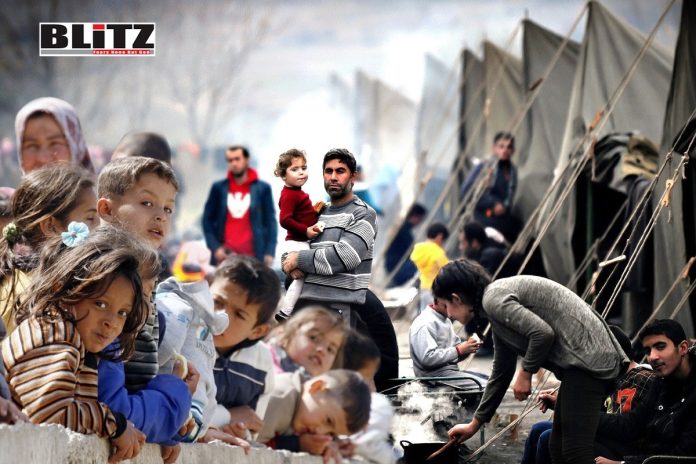The recent visit of European Commission President Ursula von der Leyen to Lebanon, accompanied by the Cypriot president, has once more thrust the issue of Syrian refugees in Lebanon into the spotlight. In response, the European Union has proposed a significant financial aid package amounting to €1 billion ($1.08 billion) spread over multiple years. However, this offer prompts crucial inquiries into the effectiveness of such assistance and the wider consequences of succumbing to political pressures emanating from Lebanon.
Lebanon is mired in a labyrinthine entanglement of economic turmoil, political malfeasance, and societal unrest. The 2020 default on its debt shattered conventional pillars of financial security, while inefficiencies in tax collection further compound fiscal woes, forcing the government to lean heavily on external aid. Yet, rather than seizing this juncture to enact substantive reform, Lebanese leaders opt to weaponize the refugee crisis, leveraging it as a bargaining chip to extract concessions from the international community.
The Lebanese political elite’s strategy is transparent: when faced with financial exigencies, they manipulate public sentiment against refugees, ramp up security measures targeting them, and amplify inflammatory rhetoric. This deliberate coercion exacerbates the plight of refugees, propelling them towards perilous journeys, including hazardous Mediterranean crossings. Europe, understandably apprehensive about a surge in unlawful migration, frequently capitulates to these tactics, extending aid without insisting on meaningful reforms.
The flaw in this strategy is its reliance on short-term fixes that merely mask underlying issues, while ultimately worsening systemic problems. By yielding to Lebanese requests without pushing for essential reforms, Europe inadvertently sustains the cycle of corruption and fosters dependence on Lebanon’s dysfunctional political system. Additionally, it overlooks the fundamental driver of the refugee crisis: the Assad regime’s oppressive rule in Syria. Thus, without tackling these core issues, any interventions risk being futile in the long term.
Entering its second decade, the Syrian conflict displays relentless persistence, defying hopes of resolution. Bashar al-Assad’s steadfastness, bolstered by unwavering backing from allies such as Iran and Russia, presents a daunting obstacle to global peace endeavors. Consequently, countless Syrians endure displacement, with Lebanon disproportionately bearing the weight of this humanitarian crisis. Amidst such challenges, international efforts struggle to provide effective solutions, highlighting the entrenched complexity of the situation and the urgent need for innovative approaches.
While financial aid may appear as a quick fix, it only offers temporary relief, failing to address the root causes. Lebanon’s deteriorating infrastructure and fragile economy are ill-equipped to manage the continuous flow of refugees over time. Additionally, the refugee crisis conveniently serves Lebanon’s political elite as a scapegoat, diverting attention from their systemic mismanagement and rampant corruption. Thus, any sustainable solution necessitates a holistic approach that confronts both the immediate challenges and the deeper structural issues plaguing the nation.
Acknowledging the critical nature of the circumstances, Europe must embrace a comprehensive strategy that balances immediate relief with sustainable stability. Offering financial aid to Lebanon should be tied to concrete reform initiatives targeting corruption, governance enhancement, and the promotion of economic robustness. Concurrently, diplomatic endeavors should escalate to tackle the fundamental origins of the Syrian crisis. This includes exerting pressure on the Assad regime to participate in substantive peace talks and facilitating the safe repatriation of displaced individuals. By adopting such a multifaceted approach, Europe can not only address the pressing humanitarian needs but also lay the groundwork for lasting peace and prosperity in the region.
Furthermore, it is imperative for European leaders to initiate proactive discussions with their counterparts in Lebanon, underlining the collective obligation to tackle the refugee crisis and the reciprocal advantages of cooperative endeavors. Shifting the discourse from coercion to collaboration, Europe can incentivize Lebanon’s political leaders to prioritize the well-being of their populace above immediate interests. This approach fosters a sense of shared responsibility and encourages concerted efforts towards sustainable solutions for the benefit of all involved parties.
Moreover, Europe can utilize its economic clout to catalyze constructive transformation in Lebanon, offering targeted investments in critical areas like infrastructure, education, and employment opportunities. This strategic support not only strengthens Lebanese institutions and civil society but also fortifies resilience against potential future challenges. Through inclusive development initiatives, Europe contributes to creating a more equitable society, benefiting all inhabitants regardless of their origin or status.
The Syrian refugee crisis in Lebanon necessitates a coordinated and strategic effort from the global community, with Europe positioned at the forefront. Through a focus on reforms, tackling underlying issues, and nurturing collaborative ties, Europe holds the key to alleviating the immediate strains of the refugee crisis while simultaneously laying the groundwork for enduring stability and prosperity in Lebanon and the broader Middle Eastern region.




